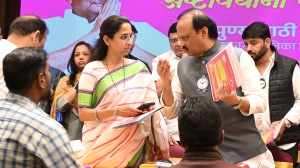Sleepless Network
The roads lie empty,filled only with dark shadows and the yap of dogs. Most people toss on their pillows and dream their unknown dreams.
Teenagers and young adults are late to sleep and late to rise thanks to technology
It is 4 am. The roads lie empty,filled only with dark shadows and the yap of dogs. Most people toss on their pillows and dream their unknown dreams. But for a small section of society,cast in the blue glow of the computer screen,this isnt the time to sleep. Instead its time to catch up with friends,make plans for the next day or simply some me time.
Nineteen-year-old Aditi Biswas from Delhi,currently studying at the Institute of Hotel Management,Bangalore,says,Everybody else would stay up late and then get up late in the morning,or at noon. It just rubbed off on me. Today,going to bed at 3 or 4 am is normal for her,just as it is for most teenagers from different cities.
Others may call their lifestyle abnormal,but for them its just routine. Theres so much to do, says Sarika Anand,a 17-year-old student of arts at Wadia College,Pune. Some of my friends are studying abroad and I get a chance to catch up with them only at night. We usually chat on Gtalk or Skype or Facebook chat. And Im also a movie buff,so I catch up on the films Ive missed or I flick through the movie channels on the telly and watch a late night film. Theyre usually scary ones and I love them, she says. Ask her what time she wakes up,and her mother replies,Sometimes 8 am when she has lectures to attend,otherwise its noon or even 2 pm.
Mumbai-based psychologist Natasha Thomas attributes this sleepless routine to advances in technology. A couple of months ago,a survey by the University of Maryland in the U.S. threw light on the growing reliance that the younger generation has on technology. According to the International Centre for Media and the Public Agenda,youngsters are inseparable from their mobile phones,computers,MP3 players and TV and some are so addicted that they feel like theyve lost a limb without them.
According to Thomas,being surrounded by technology 24X7 overloads youngsters with information and they remain constantly stimulated. Around two or three decades ago,the moment you entered your house,you lost contact with the world outside your home. Whereas these days,it hardly matters whether you are on a plane,a hospital or in your bathroom. The virtual network is too irresistible for youngsters to not get pulled into it, she says.
Teenager Krushna Dharia cant think of sleeping before 2 am. I browse the internet or watch movies. Im not a morning person,anyway,so theres no point sleeping early, says this student of Jai Hind College,Mumbai,whose friends also keep her company in the late hours. We are usually on Facebook, she adds. Aditi chips in,Everyones usually awake through the night.
Some of the short-term effects of these sleepless nights and sleepy days include loss of appetite,hair fall and poor concentration. Pune-based doctor Aniket Joshi warns,They could also face severe long term effects like anxiety,depression,hypertension,obesity,anaemia,aggression etc..
But its tremendous peer pressure that compels the young brigade to appear active on social networking websites. You are considered uncool or a behenji if you do not know whats in or trending these days. The only way to know is to be a part of the circle: Facebook,Gtalk and my cellphone help me stay connected with my friends, says 19-year-old Ankita Modi.
For some teens,however,like 17-year-old Pune-based Faizan Ansari,unwinding in the wee hours is about me time. I read a book or watch TV or sometimes log on to the internet. I keep busy through the day,either with studies or extra-curricular activities like theatre. So,I dont waste any daylight hours on chilling. Thats meant for night-time when important work is over, he says.
- 01
- 02
- 03
- 04
- 05































